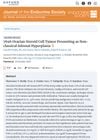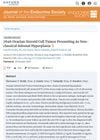 7 citations,
April 2019 in “The Journal of Steroid Biochemistry and Molecular Biology”
7 citations,
April 2019 in “The Journal of Steroid Biochemistry and Molecular Biology” 11α-Hydroxyprogesterone is changed into different substances by certain enzymes and may play a role in prostate cancer.
 27 citations,
July 1982 in “British Journal of Dermatology”
27 citations,
July 1982 in “British Journal of Dermatology” The antiandrogen 11α-hydroxyprogesterone effectively reduces skin oil and cholesterol when applied to the skin.
 7 citations,
October 2019 in “Case reports in endocrinology”
7 citations,
October 2019 in “Case reports in endocrinology” A young woman's symptoms suggested PCOS, but tests and surgery confirmed and treated a rare ovarian tumor, resolving her condition.
 2 citations,
January 2013 in “Elsevier eBooks”
2 citations,
January 2013 in “Elsevier eBooks” The chapter explains the causes of excessive hair growth and masculinization in women and how to measure hormone levels related to these conditions.
 2 citations,
April 2013 in “Expert Review of Endocrinology & Metabolism”
2 citations,
April 2013 in “Expert Review of Endocrinology & Metabolism” Identifying nonclassic congenital adrenal hyperplasia and carriers of CYP21 mutations is challenging, and genetic counseling is recommended due to their prevalence.
 100 citations,
May 2011 in “Journal of Pediatric and Adolescent Gynecology”
100 citations,
May 2011 in “Journal of Pediatric and Adolescent Gynecology” The document concludes that proper diagnosis and a multidisciplinary approach are crucial for managing Congenital Adrenal Hyperplasia effectively.
 30 citations,
June 2019 in “Frontiers in Endocrinology”
30 citations,
June 2019 in “Frontiers in Endocrinology” The document concludes that managing non-classical congenital adrenal hyperplasia in females requires personalized treatment, genetic counseling, and a team of specialists.
 October 2024 in “Journal of the Endocrine Society”
October 2024 in “Journal of the Endocrine Society” Early detection of ovarian steroid cell tumors is crucial to prevent lasting symptoms.
 49 citations,
January 2010 in “International Journal of Pediatric Endocrinology”
49 citations,
January 2010 in “International Journal of Pediatric Endocrinology” The document concludes that Nonclassic Congenital Adrenal Hyperplasia requires personalized treatment plans to manage symptoms and fertility, with glucocorticoids being a common therapy.
 56 citations,
December 2011 in “Steroids”
56 citations,
December 2011 in “Steroids” The document suggests treating individuals with nonclassic congenital adrenal hyperplasia who show symptoms, especially those related to excess male hormones.
 29 citations,
December 2012 in “Current Opinion in Endocrinology, Diabetes and Obesity”
29 citations,
December 2012 in “Current Opinion in Endocrinology, Diabetes and Obesity” With careful management, people with congenital adrenal hyperplasia can have successful pregnancies and become parents.
 20 citations,
October 2017 in “Clinical Endocrinology”
20 citations,
October 2017 in “Clinical Endocrinology” The conclusion is that removing both ovaries is the best treatment for excess male hormones in postmenopausal women, with medication as another option, and managing insulin resistance is important for diagnosis and treatment.
 11 citations,
August 2019 in “The Journal of Sexual Medicine”
11 citations,
August 2019 in “The Journal of Sexual Medicine” Women with nonclassic congenital adrenal hyperplasia experience more sexual dysfunction and distress.
 6 citations,
December 2010 in “Case Reports”
6 citations,
December 2010 in “Case Reports” A woman with high testosterone and an adrenal nodule had an ovarian tumor causing her symptoms, which improved after the tumor was removed.
 4 citations,
December 2022 in “Frontiers in Endocrinology”
4 citations,
December 2022 in “Frontiers in Endocrinology” Treating non-classic congenital adrenal hyperplasia is complex because the benefits of hormone treatment must be weighed against potential health risks.
 October 2024 in “Journal of the Endocrine Society”
October 2024 in “Journal of the Endocrine Society” Ovarian steroid cell tumors can mimic adrenal hyperplasia, and surgery can normalize hormone levels.
 19 citations,
August 1999 in “European journal of endocrinology”
19 citations,
August 1999 in “European journal of endocrinology” The study concluded that testing hormone levels after stimulation is not reliable for identifying carriers of 21-hydroxylase deficiency; genetic testing is necessary.
10 citations,
November 2019 in “Neuroendocrinology” Measuring 17-hydroxyprogesterone in hair can help monitor androgen levels in people with congenital adrenal hyperplasia.
 9 citations,
February 2019 in “Journal of Clinical Research in Pediatric Endocrinology”
9 citations,
February 2019 in “Journal of Clinical Research in Pediatric Endocrinology” Children with classic congenital adrenal hyperplasia have thicker heart fat and are at higher risk for heart problems and early atherosclerosis.
 1 citations,
January 1986 in “Journal of Steroid Biochemistry”
1 citations,
January 1986 in “Journal of Steroid Biochemistry” Women with excessive hair growth or polycystic ovary disease may more often carry a gene variant for 21 hydroxylase deficiency.
 9 citations,
June 2014 in “European Journal of Obstetrics & Gynecology and Reproductive Biology”
9 citations,
June 2014 in “European Journal of Obstetrics & Gynecology and Reproductive Biology” Blood AMH levels are higher in women with PCOS than in those with other similar conditions.
 1 citations,
August 2012 in “Journal der Deutschen Dermatologischen Gesellschaft”
1 citations,
August 2012 in “Journal der Deutschen Dermatologischen Gesellschaft” A woman's hyperandrogenism was caused by a genetic mutation leading to non-classic adrenogenital syndrome.
 117 citations,
May 2017 in “Human Reproduction Update”
117 citations,
May 2017 in “Human Reproduction Update” The update highlights that non-classic congenital adrenal hyperplasia is common in women with excess male hormones, requires specific hormone tests for diagnosis, and has various treatment options depending on age and symptoms.
 42 citations,
April 2013 in “Steroids”
42 citations,
April 2013 in “Steroids” Non-classic congenital adrenal hyperplasia is a common disorder causing symptoms like acne and infertility, and it's managed based on symptoms, not just test results. Treatment can improve fertility and reduce miscarriage risk.
 34 citations,
March 2003 in “Veterinary Dermatology”
34 citations,
March 2003 in “Veterinary Dermatology” Most dogs with alopecia had higher than normal levels of certain hormones, but hair loss might not always be linked to these hormone changes.
 19 citations,
January 2017 in “Hormone Molecular Biology and Clinical Investigation”
19 citations,
January 2017 in “Hormone Molecular Biology and Clinical Investigation” High levels of male hormones are very common in women with PCOS and affect their metabolism differently depending on their weight.
 13 citations,
May 1996 in “Archives of Disease in Childhood”
13 citations,
May 1996 in “Archives of Disease in Childhood” Siblings with signs of virilization should be tested for non-classical congenital adrenal hyperplasia, which does not affect adult height but may impact fertility and well-being if untreated.
 4 citations,
December 2012 in “Arquivos Brasileiros De Endocrinologia E Metabologia”
4 citations,
December 2012 in “Arquivos Brasileiros De Endocrinologia E Metabologia” A postmenopausal woman's masculine symptoms improved after surgery for a hormone-producing ovarian tumor.
 1 citations,
October 2022 in “Curēus”
1 citations,
October 2022 in “Curēus” Diagnosing simple-virilizing congenital adrenal hyperplasia can be difficult and requires thorough testing and expert advice.
 October 2018 in “Journal of Clinical Research in Pediatric Endocrinology”
October 2018 in “Journal of Clinical Research in Pediatric Endocrinology” Children with classic congenital adrenal hyperplasia have thicker heart fat and more heart and blood vessel risk factors, especially if their condition is not well-controlled.




























